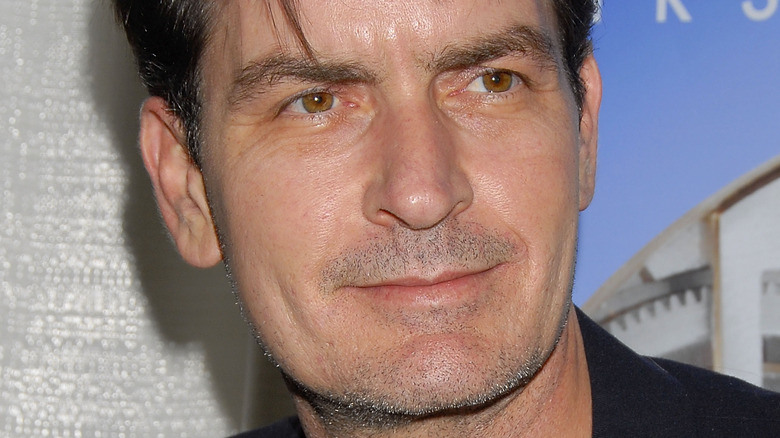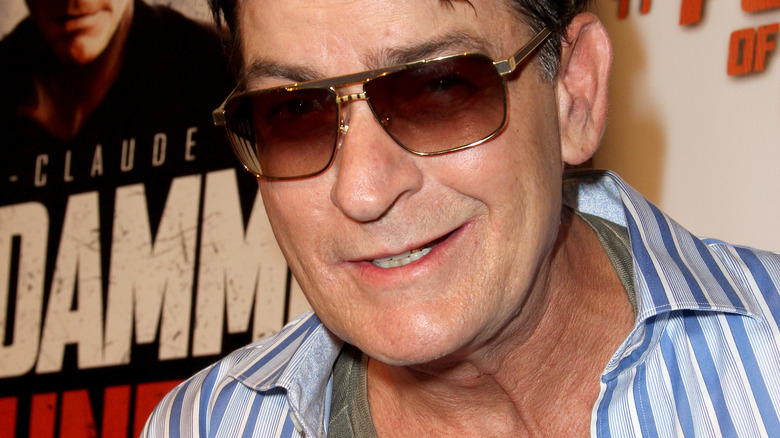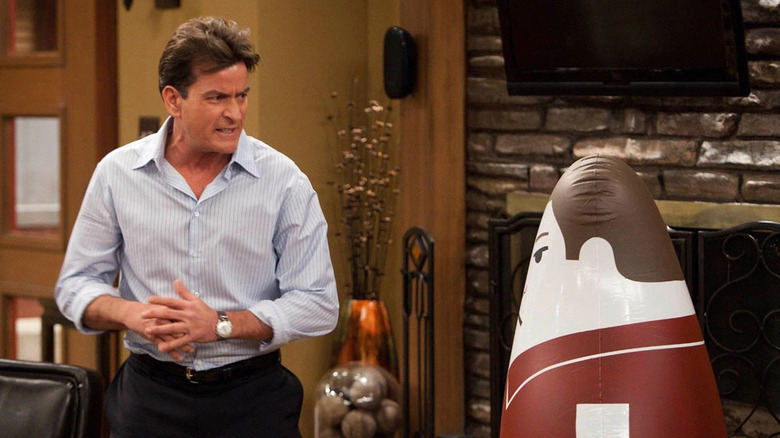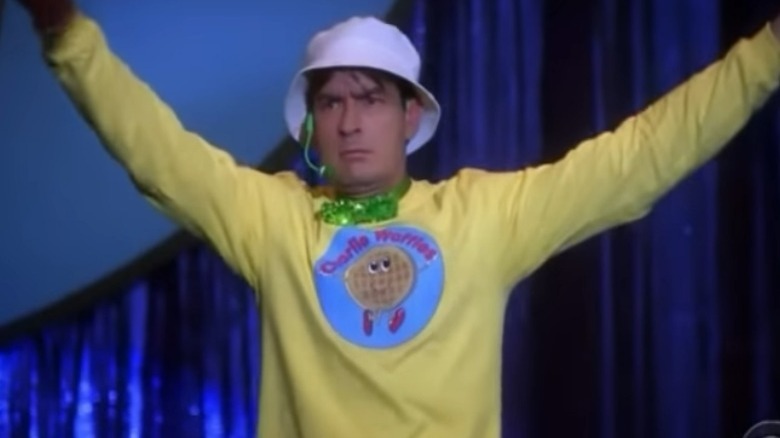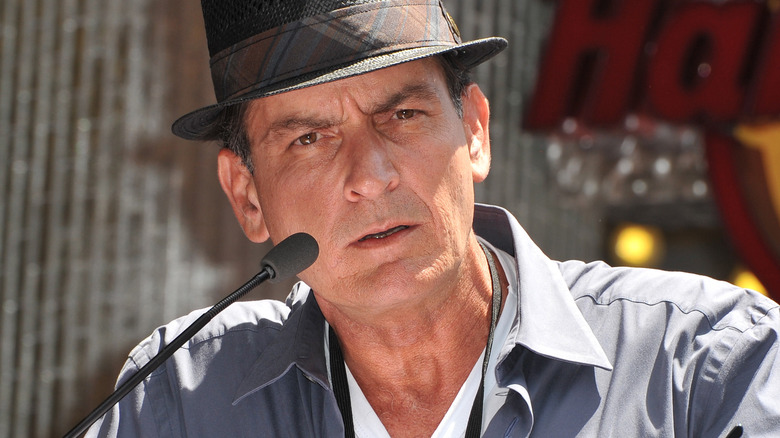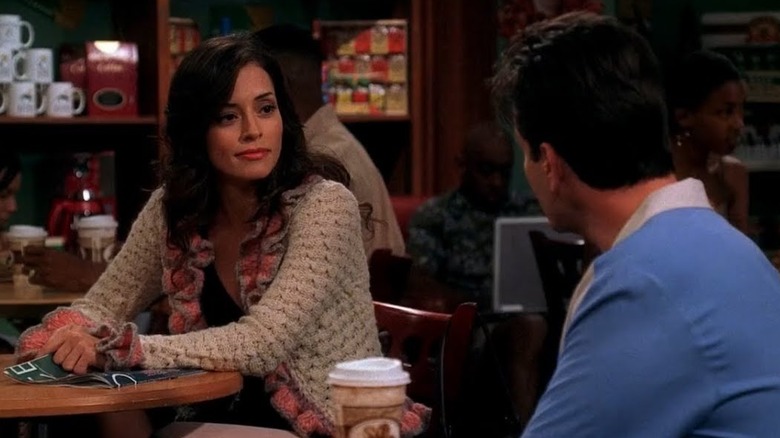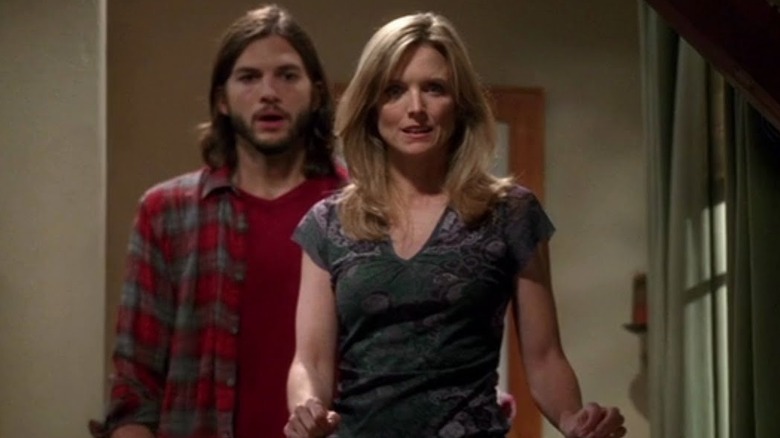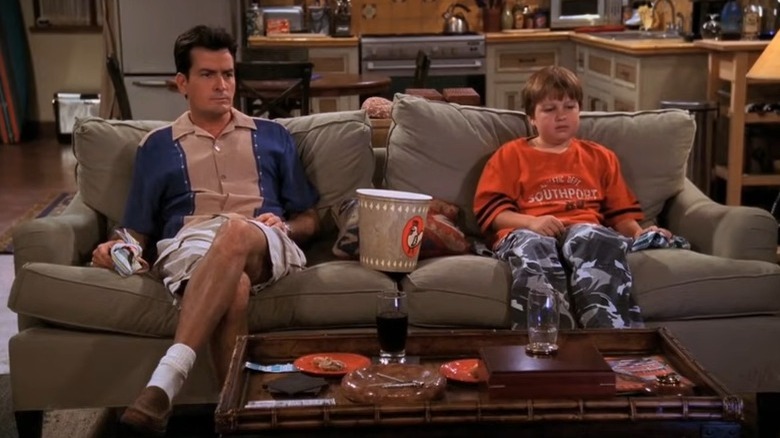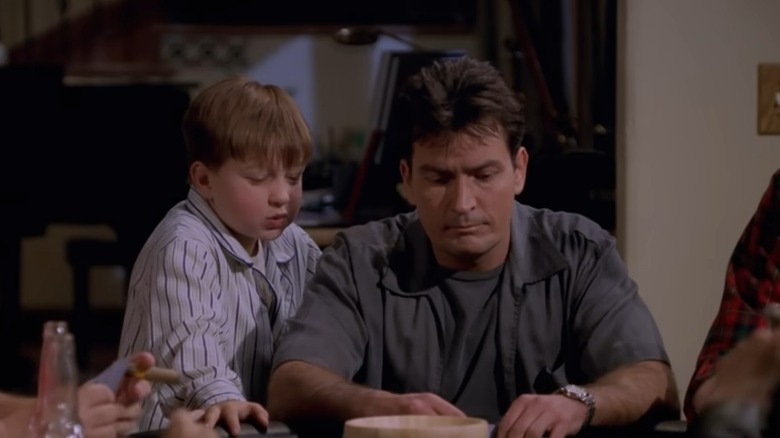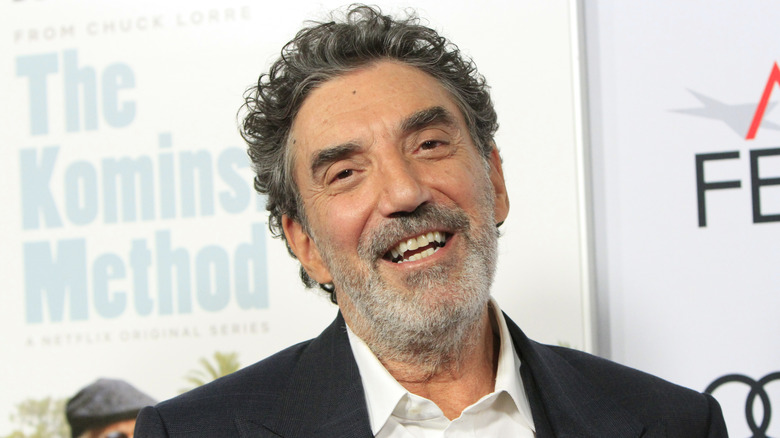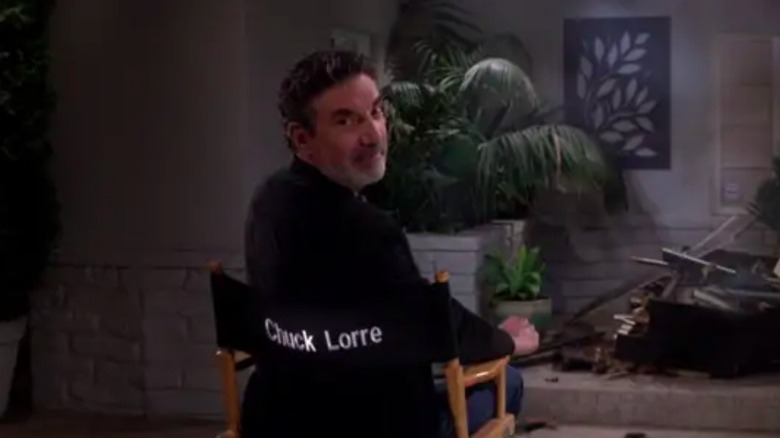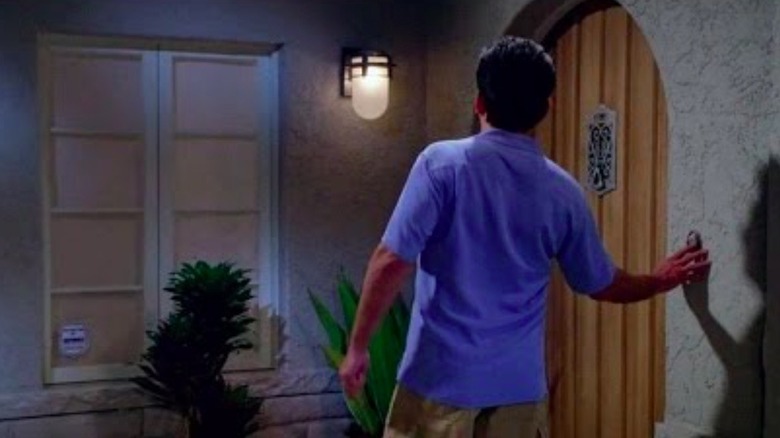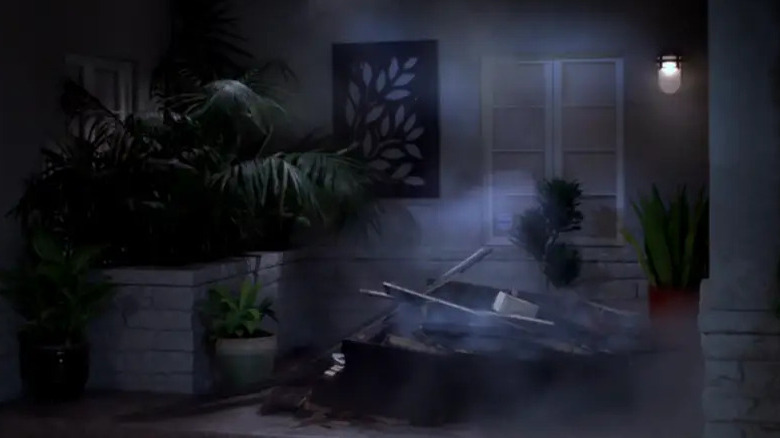The Ending Of Two And A Half Men Explained
For a brief period, "Two and a Half Men" was one of the most successful shows on national television. Earning predominantly high viewership numbers on a weekly basis, the CBS sitcom was one of the most-watched shows in America at its peak. By 2012, it became the third highest-earning series of the year, raking in an average of $3.24 million per episode.
Despite its monetary success, "Two and a Half Men" earned largely mixed reviews throughout its lengthy run from 2003 to 2015. However, critical opinion of the series gradually worsened with time after Charlie Sheen's tumultuous fallout with creator Chuck Lorre and his subsequent departure from the show. With Ashton Kutcher in the lead role, "Two and a Half Men" limped on for another four seasons but was lambasted by critics as the series continued.
In 2015, the show aired its final episode, "Of Course He's Dead." However, like the negative reception the show faced in its last four seasons, the finale was met with overwhelmingly poor reviews from critics — Variety even went so far as to label it one of the worst series conclusions of all time.
As disastrous — and at times bizarre — as "Of Course He's Dead" is, there is plenty to unpack about the show's concluding episode. From some of the more subtle digs at former star Charlie Sheen to information about certain cameos, here's everything you need to know about the finale of "Two and a Half Men."
Charlie's texts to Walden spoof Charlie Sheen's bizarre comments in real life
In "Of Course He's Dead," Walden receives a text from Charlie, which is a lengthy rant against the new lead character of "Two and a Half Men." This rant contains plenty of strange comments, including the phrases "bayonets of truth," "an army of assassins," and allusions to Charlie's "tiger blood."
Many of these phrases are taken almost verbatim from comments Charlie Sheen made following his departure from "Two and a Half Men." The "bayonets of truth" line is likely meant as a parody of Sheen's live tour, "Fastball; My Violent Torpedo of Truth/Defeat is Not an Option," announced shortly after his contract's termination with CBS. The "army of assassins" he threatens Walden with is a reference to Sheen's comments on "The Alex Jones Show," with Sheen saying of himself, "There's a new sheriff in town. And he has an army of assassins."
The line about Charlie's "tiger's blood" is an obvious riff on Sheen's now infamous interview with ABC News. After discussing his past use of alcohol and drugs, Sheen said, "I just have a different constitution, I have a different brain, I have a different heart. I got tiger blood, man."
Furthermore, Charlie's text to Walden, calling him a "troll," may also be a reference to Sheen's past comments about Jon Cryer after his dismissal, in which he called Cryer "a turncoat, a traitor, a troll" for not defending him from CBS and Chuck Lorre.
Charlie Sheen's run with Anger Management
In part two of the finale, Alan and Walden go to the police to ask for their assistance. While meeting with police Lieutenant Wagner (Arnold Schwarzenegger), the two provide a summary of the entire series in a meta dialogue. After Walden underscores just how dangerous Charlie's rage is, Wagner asks the duo if Charlie ever tried anger management. This leads Alan to quip, "Yeah, but it didn't work."
This joke is a dig at Charlie Sheen's 2012 FX series, "Anger Management," which he worked on after "Two and a Half Men." The premise of the series was meant as a somewhat self-aware meditation on Sheen's own rage issues, with the actor playing a former baseball player whose career comes to an end because of his uncontrollable anger. The sitcom was Sheen's first acting role after "Two and a Half Men," and was meant as his return to TV after his fallout with Chuck Lorre.
While "Anger Management" ran for a healthy two seasons, it earned mixed to negative reviews from critics, some unfavorably comparing it to Sheen's previous role in "Two and a Half Men." The New York Times' Alessandra Stanley wrote, "The plot seems to owe more to karma than clever scriptwriting. It could just as easily be titled 'One and a Half Men.'" Shortly after its 100th episode aired, the show was canceled by FX — leading to Alan's sardonic joke in "Two and a Half Men"'s final episode.
Rose holding Charlie hostage is a parody of The Silence of the Lambs
At the start of "Of Course He's Dead," Rose is shown preparing a meal and descending into her basement, where a large pit is seen in the middle of the floor. Placing the meal into a basket and lowering it into the hole, she tells the unseen character (later revealed to be Charlie) to eat the meal she prepared and to change his clothes, referring to Charlie as "it" instead of "he." When Charlie appears reluctant to do either, Rose threatens to spray him with a large fire hose until he complies.
This entire scene is meant as a direct parody of 1991's Academy Award-winning psychological horror film, "The Silence of the Lambs." In that film, the serial killer antagonist known as Buffalo Bill (Ted Levine) keeps his victims in a large pit located in his basement, very much like Rose's own pit in "Two and a Half Men." Buffalo Bill also takes to addressing his victims with the dehumanizing "it" and threatens to spray them with a hose should they disobey him.
The influence "The Silence of the Lambs" has on the finale doesn't stop there, either. Later in the episode, during the finale's animated flashback sequence, Rose is seen transporting Charlie from Paris on a metal gurney, with Charlie restrained via a straight jacket and muzzle — the exact same manner that Anthony Hopkins' iconic serial killer, Hannibal Lecter, is transported.
Charlie's residual checks are a callback to his earlier career as a children's songwriter
The main action of "Of Course He's Dead" begins when Alan receives a letter addressed to Charlie concerning unclaimed royalties that add up to around $2.5 million. As a dumbfounded Alan processes this bit of news, Walden comments, "It looks like those children's records he made are still making money." This is a reference to Charlie's previous career in the show as influential children's musical artist, Charlie Waffles, first introduced to the show back in Season 5.
After Charlie's career as a jingle writer seemingly stalls out, Charlie begins to explore other career options in the music industry. Upon babysitting the four-year-old son of one of his girlfriends, Charlie is approached by a music executive to produce children's records in "Putting Swim Fins on a Cat." With financial hardships bearing down on him, Charlie agrees, leading to his extremely lucrative career as the children's musical artist Charlie Waffles.
Charlie's persona as Charlie Waffles comes up a few times later in the show — namely in Season 5's "Is There a Mrs. Waffles?" — but for the most part goes unmentioned for the remainder of Charlie's time on the show.
Charlie's rant against a former employer is a reference to Charlie Sheen's real-life drama with Chuck Lorre
As Alan struggles to find Charlie's death certificate in "Of Course He's Dead," Walden looks for evidence online that Charlie is actually dead. However, he is also unable to find any obituaries or notices about Charlie's death — although he does find "one weird rant against a former employer." This is a clear reference to Charlie Sheen's very public falling out with "Two and a Half Men" creator Chuck Lorre, which led to Sheen's dismissal from the show in 2011.
The initial strife between Sheen and Lorre began when production of Season 8 of "Two and a Half Men" came to a temporary pause in 2011 so that Sheen could attend rehab for drug and alcohol addiction, as reported by Deadline. However, the show was outright canceled soon after Sheen made several derogatory comments about Lorre in interviews with the press.
On "The Alex Jones Show," Sheen lashed out against Lorre for what he believed was the showrunner probing too deeply into his personal life. Sheen also asserted his belief that he was the main reason accounting for the show's enduring success, spouting several insults at Lorre. These comments — largely believed to be anti-Semitic — were the main reason CBS fired Sheen from "Two and a Half Men." However, the show was saved from permanent cancellation when Ashton Kutcher was brought on board to replace Sheen's character in the series.
Charlie's past romances
Halfway through the finale, a montage shows several women from Charlie's past receiving personal apology letters and large checks in the mail. Three of these four women played larger roles earlier in "Two and a Half Men," two of whom Charlie even came dramatically close to marrying in the series' initial seasons.
During this montage, viewers see Charlie's former girlfriends, Mia (Emmanuelle Vaugier), Chelsea (Jennifer Taylor), and Dolores Pasternak (Missi Pyle), each receive an apology note and a check from Charlie. Mia was a ballet teacher who Charlie fell in love with in Season 3 of "Two and a Half Men" and became a regular romantic interest for Charlie from Seasons 5 through 7. She was also his fiancée for a short time in Season 3, although Charlie decided to break off the wedding after Mia tried kicking Alan and Jake out of the house.
Chelsea was Charlie's girlfriend throughout Season 6, eventually becoming his fiancée in Season 7. Their engagement was mired by a number of personal issues and side romances on both of their parts, resulting in Chelsea breaking up with Charlie by the end of the season. Dolores Pasternak was one of Jake's teachers, introduced in Season 2, who Charlie similarly dated for a short time. The character went on to appear again in Season 6 (played by Alicia Witt) and Season 7. All three women were also featured at Charlie's funeral service in the opening moments of Season 9.
Walden and Alan's past romances
Alongside Charlie's past romantic interests, several old flames of both Alan and Walden are also featured in "Of Course He's Dead." As they anxiously await Charlie's vengeance, each of them dials up some of their long-running significant others. For Alan, this includes ex-girlfriend Lyndsey (Courtney Thorne-Smith), and his two ex-wives, Judith (Marin Hinkle) and Kandi (April Bowlby). For Walden, this includes ex-wife Bridget (Judy Greer) and ex-girlfriend Zoey (Sophie Winkleman).
All of these women played huge roles during "Two and a Half Men." Before the events of the series, Judith and Alan maintained an unhappy marriage with each other, their subsequent divorce causing Alan to move into Charlie's beach house in the pilot episode. Kandi was one of Charlie's many one-off girlfriends in Season 3 who later dated Alan, becoming his second wife soon after. They divorced in Season 4, with Kandi enjoying a successful career as a television star. Lyndsay was Alan's on-again, off-again girlfriend during the final few seasons of the series, reluctantly becoming engaged to Alan after seeing the massive ring Walden purchased on Alan's behalf.
Bridget was Walden's wife prior to his debut on the show, divorcing him because of his supposed immaturity — although she once again developed feelings for him after the divorce was finalized. After the end of his marriage to Bridget, Walden then becomes attached to Zoey, but the two break up when Zoey learns of Walden's romance with Rose in Season 10.
Charlie's fondness for Jake explains his ending
Along with the several sizable checks he sends to his ex-girlfriends, Charlie also mails a check to Jake for $250,000, which is in stark contrast to the death threats Walden and Alan receive. Likely, Charlie giving Jake such a large amount of money is meant to reflect his general warm feelings toward his nephew.
Much of the earlier seasons of "Two and a Half Men" find Charlie and Jake bonding in a variety of past-times together. Taking his young nephew under his wing, Charlie also encouraged Jake to learn from his own mistakes in life and avoid repeating them. As Jake grew older and became increasingly distant from his father and uncle, Charlie was seen to treat him less warmly than he had in previous seasons. Still, he admitted to harboring a fond place for Jake a few times as the show went on, usually when he was inebriated.
Charlie sending Jake money illustrates that — despite his vehement ill will towards his father and Walden — he still holds some love for his nephew, leaving their relationship on a high note in the finale.
Jake's Las Vegas winnings are due to his childhood gambling with Charlie
After receiving Charlie's check for $250,000, Jake tells Alan and Walden that he stopped at Las Vegas before visiting them, winning a total of $2.5 million from playing craps. In many ways, this might appear like a throwaway joke meant to provide Jake a fitting epilogue for his character, but it also ties in greatly to his relationship with his uncle Charlie as well.
In the early seasons of "Two and a Half Men," Charlie was shown teaching Jake various adult activities — most notably poker. From Jake watching his uncle play Texas Hold 'em with his friends to the two of them betting on sports games together, Charlie instructed Jake on all the subtleties of gambling from an incredibly young age. As an adult, it makes sense that Jake learned to become an effective enough gambler to increase his winnings from $250,000 to $2.5 million, perfectly tying into the show's continuity and all the gambling lessons he accumulated from Charlie over the years.
The meta nature of the finale
One of the more unique aspects of "Of Course He's Dead" is the meta-aware comedic style of the finale. Over the course of the episode, numerous jokes are made about the show's content, the ludicrousness of its central storyline and characters, and the real-life drama surrounding former star Charlie Sheen's behavior in his personal life. There are even a handful of moments where the actors address the audience members, regularly breaking the fourth wall.
The creator of "Two and a Half Men," Chuck Lorre, has discussed the more self-referential humor that the finale employed with Entertainment Weekly. There, Lorre said that the comedic style of "Of Course He's Dead" was meant mostly as a way for the show to conclude in a humorous way. "It was our last swing at that bat. Why not throw the rules out and do everything we can imagine that might be funny and acknowledging the meta elements of the show?" the showrunner said.
Lorre also told EW that he felt the show didn't warrant a more emotional undertone, as there was no central storyline imparted from the beginning of the show that could be effectively wrapped up with its conclusion. "We're not going to find out how he met his mother. This isn't about how did they get on the island," Lorre said, referencing both "How I Met Your Mother" and "Lost."
Chuck Lorre's appearance and his winning comment
In the closing moments of "Of Course He's Dead," Charlie — played by an extra and seen only from behind — has a baby grand piano crash on top of him from a helicopter overhead. As the camera pans away from the scene, it shows series creator Chuck Lorre seated in a director's chair. Turning to the camera, Lorre smiles at the viewers and says, "Winning!" before similarly having a piano fall on top of him.
Lorre's comment is meant as a parody of Charlie Sheen's famous comments after being fired from "Two and a Half Men." In an interview with ABC News, Sheen was asked whether he was potentially suffering from bipolar disorder, with Sheen quickly retorting, "I'm bi-winning. I win here and I win there." This comment — along with his assertions that he has "tiger blood" — later became the basis for a popular meme and a 2011 rag single with artist Snoop Dogg. Prior to its appearance in "Of Course He's Dead," the quote was also referenced in Season 9 of "Two and a Half Men," when Alan begins to believe he's Charlie.
Charlie's death scene explained
As mentioned above, the final scene of "Two and a Half Men" sees Charlie meeting his premature end after a piano crushes him. While Charlie's character here is played by a body double — his face never revealed to the camera — it was initially planned for Charlie Sheen to return to "Two and a Half Men" as a special guest star for the finale.
In his interview with EW, Chuck Lorre said that he and CBS had tried reaching out to Sheen to negotiate his return for "Of Course He's Dead." However, as Chuck Lorre said on his trademark vanity card for the episode, Sheen wanted the show to end on a more cathartic note, leaving open the possibility of a spin-off series starring himself and Jon Cryer titled "The Harpers." With Lorre wanting to maintain a more lighthearted tone for the finale, he refused, and the negotiations between himself and Sheen soon fell apart.
Per Lorre's vanity card for the episode, the initial plan was to have Charlie turn to the camera and deliver a monologue about the dangers of drug use. Over time, Charlie's speech would devolve into a bizarre tirade about how he was "a ninja warrior from Mars" and was "invincible" until his speech was cut short when a piano crashes on top of him, as it does in the finished finale.
Chuck Lorre's death scene explained
Chuck Lorre's physical presence and his subsequent death in the finale of "Two and a Half Men" can be eyebrow-raising for some viewers. However confusing and meta Lorre's appearance in the show is, though, Lorre has since justified his cameo at the end of the episode, as well as elaborating on the reasoning behind his onscreen demise.
Speaking with Entertainment Weekly, Lorre said that the piano falling on both himself and Charlie is meant as an illustration of their rocky relationship and the negative effect it had on the series. In Lorre's eyes, his feud with Sheen ultimately led to the show's steady decline as "Two and a Half Men" went on without Sheen there to headline the show.
The two pianos falling on both of them were therefore intended to be symbolic, Lorre stating, "It felt like the funniest and most succinct way to end the damn thing. And dropping the second piano also felt like an appropriate response — perhaps nobody wins, but hopefully, we laughed along the way."
